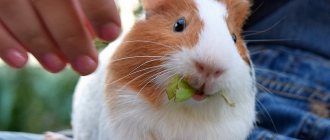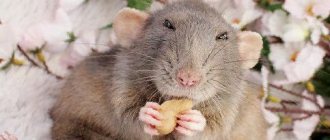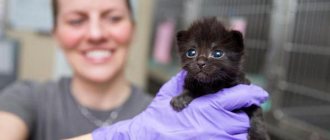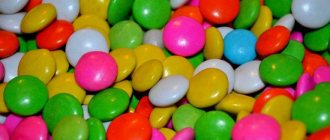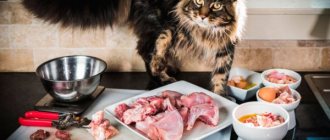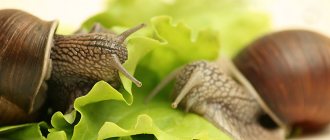- home
- Guinea pig
- Guinea pig nutrition
02/06/2019 You should not give guinea pigs the same things that other pets or the owners themselves eat. In nature, these animals constantly find new types of food and, at the level of instincts, determine their edibility and safety. At home, the pig eats monotonously, its instincts are dulled, and it eats dangerous indoor plants, found pieces of food, and what an uninformed owner offers it. The owner’s task is to protect the pet from dangerous food.
Can guinea pigs have a shepherd's purse?
Shepherd's purse (Capsella bursa-pastoris) Has anti-inflammatory and diuretic effects, inhibits the development of cancer tumors. This plant should never be given to pregnant pigs because it causes uterine contractions.
Interesting materials:
How to make a colored background in Photoshop? How to make a color gradient in Photoshop? How to make a colored circle in Photoshop? How to make a colored circle on Instagram? How to make a color prefix in Minecraft? How to make colored rice? How to make colored text in Illustrator? How to make colored text in Minecraft on PC? How to make a colored bed in Minecraft? How to make a colored frame in Photoshop?
Vegetables
It is necessary to include fresh vegetables in the pigs' diet - they improve digestion and contain vitamins and other beneficial substances. However, not all vegetables have a beneficial effect on the animals’ bodies. Some are dangerous and can cause severe harm to their health.
Prohibited products include:
- Potatoes (tubers and tops): due to the large amount of starch;
- onions (including green and leeks) and garlic;
- radish: sharp taste causes irritation of the mucous membrane;
- Rhubarb: contains oxalic acid, which is harmful to the stomach.
All of these vegetables are harmful even in small quantities, so they should be kept away from your pet.
Feeding cabbage (white and red, Brussels sprouts) is undesirable. In large quantities it causes diarrhea and flatulence. Various legume products cause bloating. Along with radishes and radishes, hot peppers are prohibited.
Solid food
Solid (roughage) food consists of grains, hay, and special food in granules, which is available in pet stores. You don’t have to give special food, but when there is no grass or hay, it is the best option. These animals love to eat this food, just as birds peck their favorite grains. Now you can buy ready-made feed in granules, intended specifically for these animals; these granules contain vitamin C. The feed contains this vitamin, it should not be stored for a long time, no more than three months. This food must be stored in a dry place, in tight packaging, otherwise it may become moldy and spoiled, becoming unsuitable for consumption.
Indoor flowers
During walks outside the cage, the animals sometimes gnaw on some indoor plants. This must be stopped immediately because most domestic plants are poisonous to pigs. It is better if the pots are located in places inaccessible to rodents.
The most popular indoor plants that are dangerous for pigs:
- azalea;
- ficus;
- lilac;
- jasmine;
- chrysanthemum;
- dahlias;
- geranium;
- lily;
- Dracaena broom.
Palm trees and cacti should also be kept away from a curious pet.
Tree branches
Twigs, leaves and any other parts of the following trees are contraindicated for guinea pigs: cypress, yew, holly, thuja, robinia, buckthorn.
The pet is also not allowed to eat acorns, nuts and chestnuts, but is allowed to try the branches of these trees from time to time. In small quantities they will not cause harm.
What drinks can you give your guinea pig?
Just remember that it is safe for pigs to drink only plain, clean water. Bitter, sweet, carbonated and alcoholic drinks are prohibited. At best, they will cause severe stomach upset, and at worst, the death of the pet.
Green food
This food must be given to your guinea pig, but you need to know what kind of greens you need to give your pet. The main herb is fresh grass from fields and meadows with medicinal and spicy herbs. You shouldn’t tear up greenery at the edge of the road, as many cars pass by and exhaust gases settle on the grass. It is not recommended to collect grass under trees either; birds like to sit on trees, and their droppings cause rotting of the greenery. Pigs love grass, it helps them always stay healthy. Greens contain many vitamins. Greenery includes not only field grass, but also that which a person eats. These animals love to eat: spinach, the stem and greens of dill, parsley, it’s worth giving a little, and lettuce and other greens.
How to choose the right mating partner
Here's how to choose the right partner for mating:
The best age for a male is from eight months to a year. It’s better not to let old “pigs” into breeding.
It is very desirable that the “groom” belongs to the same breed or at least variety. In this case, there will be much fewer problems with childbirth and pregnancy.
The optimal weight is from 0.7 to 1 kg. The female, by the way, should weigh about the same. The animal should be neither obese nor emaciated.
https://www.youtube.com/watch?v=GsW_Y5o5aZM
Finally, the pet must be completely healthy. To make sure of this, it is advisable to have the “bride and groom” examined by a veterinarian.
It is highly desirable that the animals be approximately the same in character. Two fighters can seriously damage each other’s skins; if you pit a melancholic and active pet, normal mating will not work either.
You should know about this
What could this moment be like? Eating unusual foods can cause the following disruptions in the body:
- allergy;
- problems with the urinary system;
- digestive disorders;
- poisoning
In the event of an allergic reaction, the animal's eyes may become inflamed, nasal discharge may appear, itching, loss of fur may occur, breathing becomes difficult, and the animal becomes apathetic.
Food with a high fat content makes the urine of rodents more alkaline, and this ultimately leads to damage to the kidneys and bladder, and secondary infections.
The reaction of the gastrointestinal tract may be loss of appetite, bloating, diarrhea; The vital activity of the pig decreases.
Well, some cheese ingredients are quite capable of causing acute poisoning with convulsions, vomiting, and excessive salivation. Refusal to eat may occur.
On the list of prohibited foods for guinea pigs, cheese is one of the first items along with sausage and eggs.
If the owner knows that these products are extremely harmful to his pet, he will not even try to treat him with them. And if the pig doesn’t try them, he won’t even know that they exist. And this, perhaps, will benefit her more. Cheese is still a delicacy for mice.
Results
Guinea pigs are unpretentious in maintenance and care and are not picky about food. At first glance this seems like too many restrictions. In fact, the rule is simple: food should be healthy, low-fat, free of chemicals, spices, salt, and not irritate the esophagus. Grains, greens, most fruits and vegetables, branches of fruit trees - the list of permitted products is very large. In addition, you can always buy ready-made balanced grain mixtures in the store.
There are a number of foods that should not be given to guinea pigs at all (for example, rhubarb or potato tops), and there are foods that, although they will not cause immediate irreparable harm to the pig, are still extremely undesirable for the diet of these animals.
Let's look at what is classified as “forbidden”.
So, guinea pigs should not be given:
1. Dairy products - milk, yogurt, cheese, etc. Guinea pigs are lactose intolerant because they do not have the enzyme to digest it. When dairy products enter the body, pigs develop gas and diarrhea.
Fruits and berries
Bananas
Can guinea pigs have bananas? A banana rich in potassium will benefit your guinea pig, but you should not give more than 1 piece per day.
The peel of the vegetable must be removed, as it is treated with substances hazardous to health (wax, chemicals, ethylene and pesticides). For safety, it is better to remove soft fibers from the fruit.
I'm eating a banana! Om-Nom-nom. I won't give it to you!
Can guinea pigs eat a pear?
Pears can be given with the peel, but without the seeds. The fruit is washed well and cut into pieces; the pig should be offered water along with it. Excessive consumption of pears due to their high sugar content can cause diarrhea.
Can guinea pigs eat kiwi?
Kiwi is a very healthy fruit for animals. It contains a large amount of ascorbic and folic acids. It is also rich in vitamins E, iron, calcium, magnesium and phosphorus.
Kiwi is given without skin in the form of small pieces. For your pet, you need to choose harder fruits. It is better to control the amount you eat. An increase in the dose of kiwi is permissible in autumn and winter, as well as when feeding females during pregnancy and lactation.
Can guinea pigs have oranges and other citrus fruits?
Can be used occasionally. But it is better for guinea pigs to get vitamin C from other foods, avoiding citrus fruits. Possible complications:
- oversaturation with vitamins;
- skin irritation;
- oxidation of urine.
Can guinea pigs eat apples?
Apples can be raw or dried. They have a balanced ratio of sugar and fructose (18:80%). It allows the pig to be active.
The fruit must be peeled and cut into slices. It is better not to give more than 3 pieces at a time.
Can guinea pigs eat strawberries, grapes and other berries?
Strawberries contain a sufficient amount of vitamin C to pay attention to the berry when choosing a treat for a rodent. You can also give strawberry leaves to animals.
- The pig might like grapes. You can offer the animal seedless grapes.
- Eating currants once a week will also not harm your pet.
- If you do not abuse it, you can offer the pig berries and raspberry leaves, berries, leaves and branches of blueberries, blackberries and sea buckthorn, and rose hips without seeds.
- Cranberries are given for medicinal purposes. It has an anti-inflammatory effect on the mucous membranes of the mouth, stomach, and bladder.
Feeding recommendations
The pet needs to be fed correctly so that its health remains normal, its teeth are strong, and its coat looks well-groomed. Your pet's daily menu should include:
- 50% hay; 20% dry food; 20% juicy food; 10% greens.
An important question for owners is how many times a day to give food to a guinea pig. Feeding is carried out 3 times a day. The feeder cannot be removed from the cage; food must always be available to the animal. There should also always be hay in the cage.
If there is no dry food in the animal’s diet, then it must be replaced with a similar weight of greens and raw vegetables. The menu should be varied; the rodent must be offered at least three different vegetables per day and certainly grass. It is prohibited to give your pet grass collected on the sides of highways and in industrial areas.
The optimal menu is vegetables and fruits before noon, dry food after noon.
Other
Among other things, it is worth mentioning that guinea pigs do not tolerate processed foods: fried, boiled, pickled, baked, canned. The owner must not feed the pet food from his table. Including sweets: chocolate, marshmallows, cookies, etc.
Other prohibited products include:
- mushrooms;
- sauces - ketchup, mustard, etc.;
- sorrel;
- plantain.
There are special sweets for rodents - drops. They come in different flavors - berry, citrus, vegetable. Pets really like them, they should be used carefully and offered occasionally, like regular fruits. Drops contain sugar, which is harmful to animals.
Before offering your pet something tasty, you should check the list of prohibited foods. If there is no information on a specific product, the best option is to put it aside and choose something else.
Its well-being and life expectancy depend on the proper organization of a guinea pig’s daily diet. There is a list of foods that should not be given to guinea pigs under any circumstances. Pet owners should know about this so as not to make a fatal mistake.
Prohibited Products
The list of foods that should not be fed to a guinea pig is very extensive:
- cereals;
- eggs;
- bakery and pasta products;
- fish;
- meat;
- sorrel;
- green onions;
- sweets;
- mushrooms;
- smoked meats and pickles.
Regarding whether you can give bread to guinea pigs, you need to remember one rule. Fresh flour products contribute to the development of flatulence. You can feed your pet only brown bread crackers.
Adult rodents are unable to digest lactose. Therefore, guinea pigs cannot have milk. Not only does it not provide any benefit, but it also causes serious health problems. For the same reason, owners should have no doubt whether guinea pigs can eat cheese. This product is rich in animal fats and proteins that are not digestible by rodents.
Guinea pigs should not be fed potatoes. It is rich in starch, which causes obesity. Potatoes also contain solanine, which can weaken the immune system of animals.
Guinea pigs should not be given pine, spruce, willow, rowan and oak twigs, as well as shoots of elm, hornbeam, larch and buckthorn.
